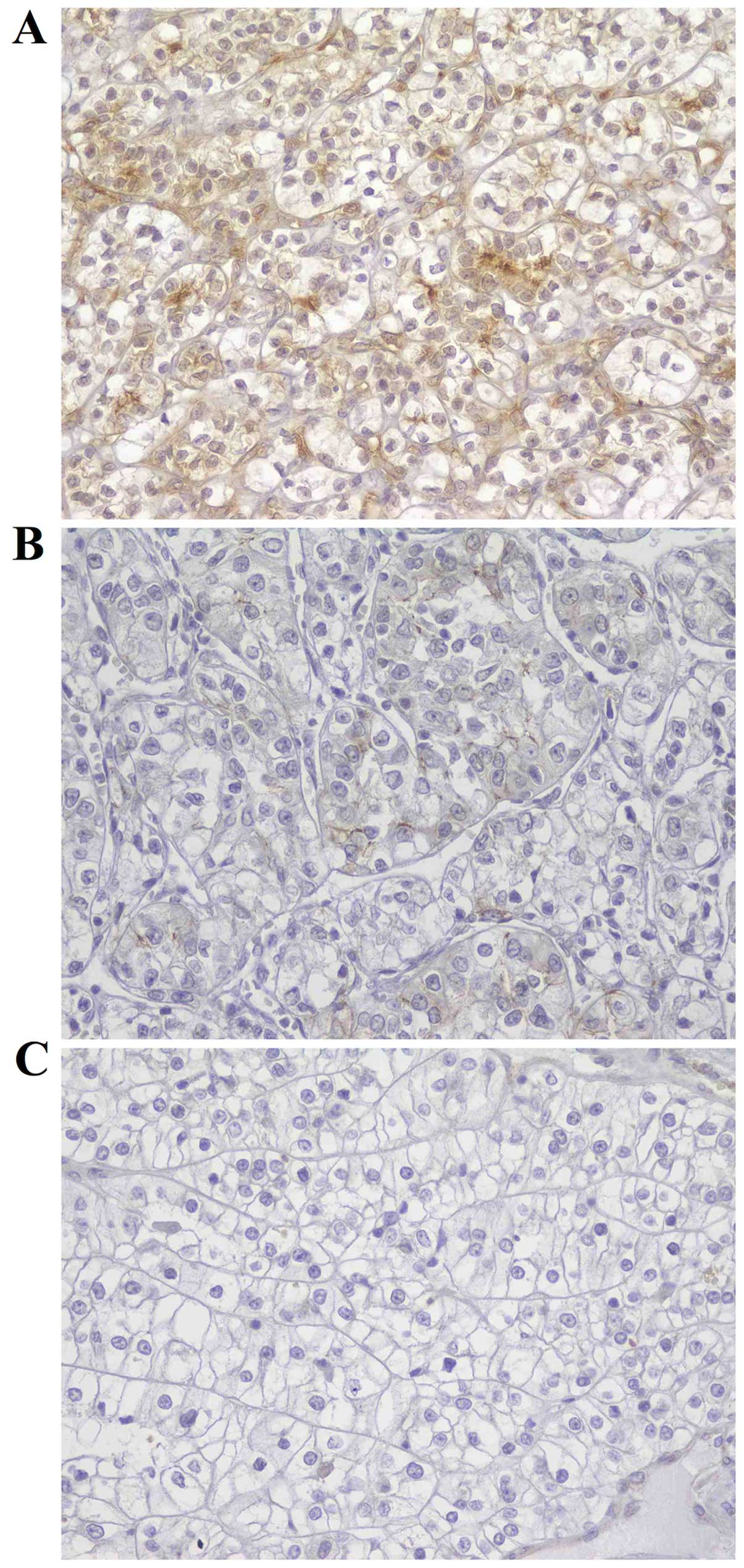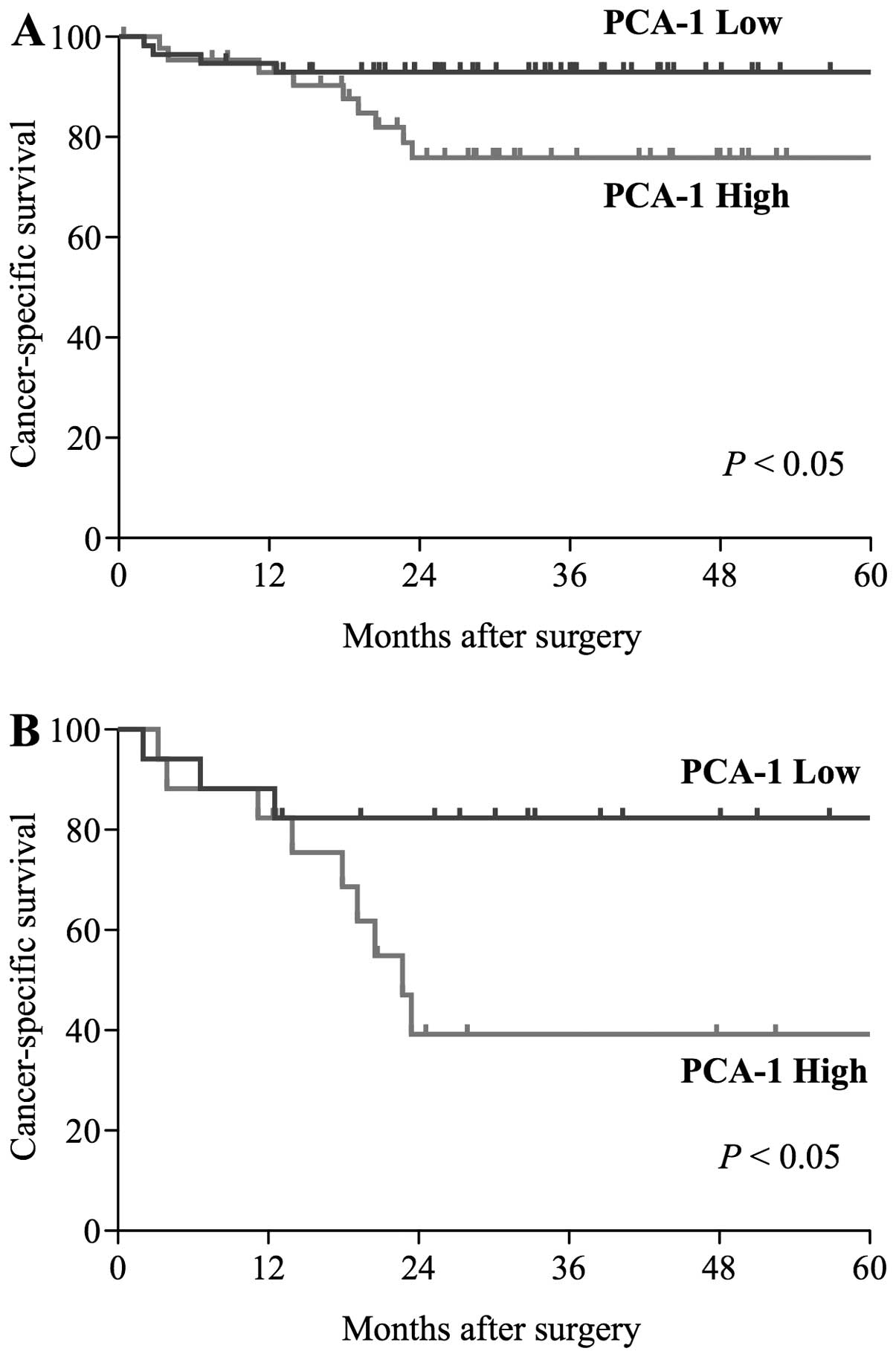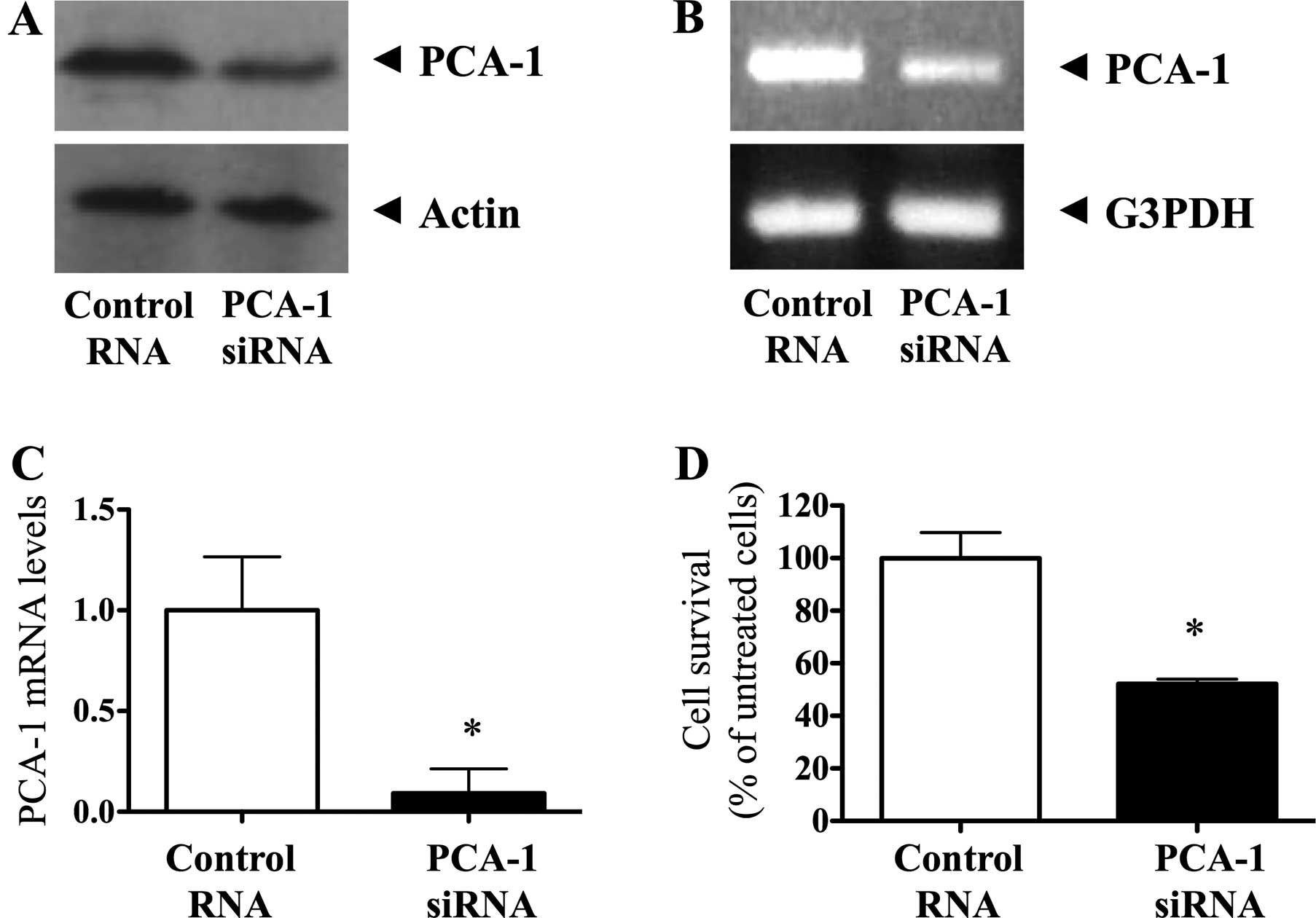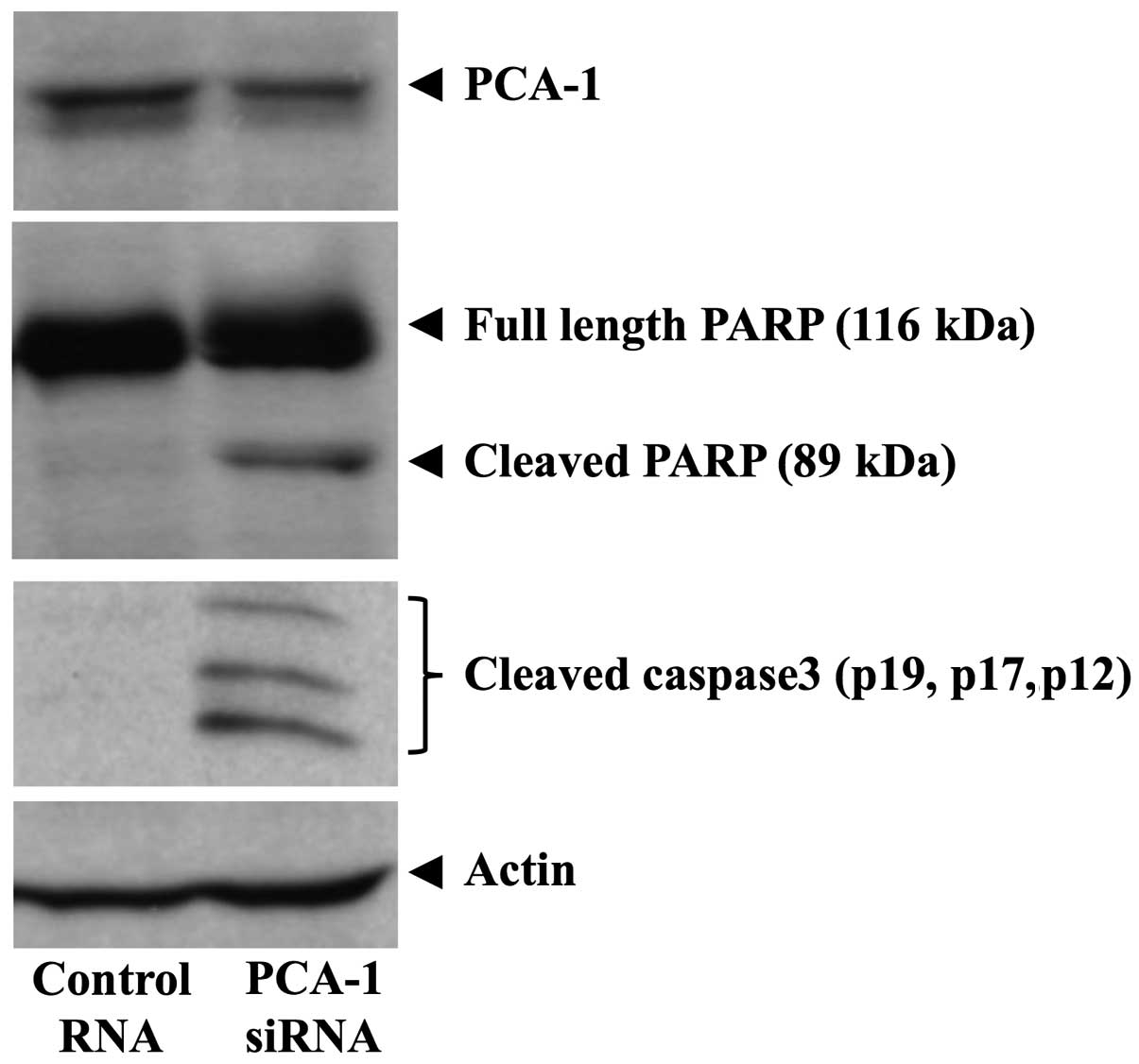|
1
|
Motzer RJ, Mazumdar M, Bacik J, Berg W,
Amsterdam A and Ferrara J: Survival and prognostic stratification
of 670 patients with advanced renal cell carcinoma. J Clin Oncol.
17:2530–2540. 1999.PubMed/NCBI
|
|
2
|
Cohen HT and McGovern FJ: Renal-cell
carcinoma. N Engl J Med. 353:2477–2490. 2005. View Article : Google Scholar : PubMed/NCBI
|
|
3
|
Yang JC, Sherry RM, Steinberg SM, Topalian
SL, Schwartzentruber DJ, Hwu P, Seipp CA, Rogers-Freezer L, Morton
KE, White DE, et al: Randomized study of high-dose and low-dose
interleukin-2 in patients with metastatic renal cancer. J Clin
Oncol. 21:3127–3132. 2003. View Article : Google Scholar : PubMed/NCBI
|
|
4
|
Motzer RJ, Escudier B, Oudard S, Hutson
TE, Porta C, Bracarda S, Grünwald V, Thompson JA, Figlin RA,
Hollaender N, et al RECORD-1 Study Group: Efficacy of everolimus in
advanced renal cell carcinoma: A double-blind, randomised,
placebo-controlled phase III trial. Lancet. 372:449–456. 2008.
View Article : Google Scholar : PubMed/NCBI
|
|
5
|
Motzer RJ, Hutson TE, Tomczak P,
Michaelson MD, Bukowski RM, Oudard S, Negrier S, Szczylik C, Pili
R, Bjarnason GA, et al: Overall survival and updated results for
sunitinib compared with interferon alfa in patients with metastatic
renal cell carcinoma. J Clin Oncol. 27:3584–3590. 2009. View Article : Google Scholar : PubMed/NCBI
|
|
6
|
Rini BI, Escudier B, Tomczak P, Kaprin A,
Szczylik C, Hutson TE, Michaelson MD, Gorbunova VA, Gore ME,
Rusakov IG, et al: Comparative effectiveness of axitinib versus
sorafenib in advanced renal cell carcinoma (AXIS): A randomised
phase 3 trial. Lancet. 378:1931–1939. 2011. View Article : Google Scholar : PubMed/NCBI
|
|
7
|
Escudier B, Eisen T, Stadler WM, Szczylik
C, Oudard S, Staehler M, Negrier S, Chevreau C, Desai AA, Rolland
F, et al: Sorafenib for treatment of renal cell carcinoma: Final
efficacy and safety results of the phase III treatment approaches
in renal cancer global evaluation trial. J Clin Oncol.
27:3312–3318. 2009. View Article : Google Scholar : PubMed/NCBI
|
|
8
|
Escudier B, Pluzanska A, Koralewski P,
Ravaud A, Bracarda S, Szczylik C, Chevreau C, Filipek M, Melichar
B, Bajetta E, et al AVOREN Trial investigators: Bevacizumab plus
interferon alfa-2a for treatment of metastatic renal cell
carcinoma: A randomised, double-blind phase III trial. Lancet.
370:2103–2111. 2007. View Article : Google Scholar : PubMed/NCBI
|
|
9
|
Hudes G, Carducci M, Tomczak P, Dutcher J,
Figlin R, Kapoor A, Staroslawska E, Sosman J, McDermott D, Bodrogi
I, et al: Global ARCC Trial: Temsirolimus, interferon alfa, or both
for advanced renal-cell carcinoma. N Engl J Med. 356:2271–2281.
2007. View Article : Google Scholar : PubMed/NCBI
|
|
10
|
Sternberg CN, Davis ID, Mardiak J,
Szczylik C, Lee E, Wagstaff J, Barrios CH, Salman P, Gladkov OA,
Kavina A, et al: Pazopanib in locally advanced or metastatic renal
cell carcinoma: Results of a randomized phase III trial. J Clin
Oncol. 28:1061–1068. 2010. View Article : Google Scholar : PubMed/NCBI
|
|
11
|
Albiges L, Choueiri T, Escudier B, Galsky
M, George D, Hofmann F, Lam T, Motzer R, Mulders P, Porta C, et al:
A systematic review of sequencing and combinations of systemic
therapy in metastatic renal cancer. Eur Urol. 67:100–110. 2015.
View Article : Google Scholar
|
|
12
|
Shimada K, Nakamura M, Ishida E, Higuchi
T, Yamamoto H, Tsujikawa K and Konishi N: Prostate cancer antigen-1
contributes to cell survival and invasion though discoidin receptor
1 in human prostate cancer. Cancer Sci. 99:39–45. 2008.
|
|
13
|
Konishi N, Nakamura M, Ishida E, Shimada
K, Mitsui E, Yoshikawa R, Yamamoto H and Tsujikawa K: High
expression of a new marker PCA-1 in human prostate carcinoma. Clin
Cancer Res. 11:5090–5097. 2005. View Article : Google Scholar : PubMed/NCBI
|
|
14
|
Aas PA, Otterlei M, Falnes PO, Vågbø CB,
Skorpen F, Akbari M, Sundheim O, Bjørås M, Slupphaug G, Seeberg E,
et al: Human and bacterial oxidative demethylases repair alkylation
damage in both RNA and DNA. Nature. 421:859–863. 2003. View Article : Google Scholar : PubMed/NCBI
|
|
15
|
Falnes PO, Johansen RF and Seeberg E:
AlkB-mediated oxidative demethylation reverses DNA damage in
Escherichia coli. Nature. 419:178–182. 2002. View Article : Google Scholar : PubMed/NCBI
|
|
16
|
Dinglay S, Trewick SC, Lindahl T and
Sedgwick B: Defective processing of methylated single-stranded DNA
by E. coli AlkB mutants. Genes Dev. 14:2097–2105. 2000.PubMed/NCBI
|
|
17
|
Tsujikawa K, Koike K, Kitae K, Shinkawa A,
Arima H, Suzuki T, Tsuchiya M, Makino Y, Furukawa T, Konishi N, et
al: Expression and sub-cellular localization of human ABH family
molecules. J Cell Mol Med. 11:1105–1116. 2007. View Article : Google Scholar : PubMed/NCBI
|
|
18
|
Chen B, Liu H, Sun X and Yang CG:
Mechanistic insight into the recognition of single-stranded and
double-stranded DNA substrates by ABH2 and ABH3. Mol Biosyst.
6:2143–2149. 2010. View
Article : Google Scholar : PubMed/NCBI
|
|
19
|
Gerken T, Girard CA, Tung YC, Webby CJ,
Saudek V, Hewitson KS, Yeo GS, McDonough MA, Cunliffe S, McNeill
LA, et al: The obesity-associated FTO gene encodes a
2-oxoglutarate-dependent nucleic acid demethylase. Science.
318:1469–1472. 2007. View Article : Google Scholar : PubMed/NCBI
|
|
20
|
Kurowski MA, Bhagwat AS, Papaj G and
Bujnicki JM: Phylogenomic identification of five new human homologs
of the DNA repair enzyme AlkB. BMC Genomics. 4:482003. View Article : Google Scholar : PubMed/NCBI
|
|
21
|
Ougland R, Zhang CM, Liiv A, Johansen RF,
Seeberg E, Hou YM, Remme J and Falnes PO: AlkB restores the
biological function of mRNA and tRNA inactivated by chemical
methylation. Mol Cell. 16:107–116. 2004. View Article : Google Scholar : PubMed/NCBI
|
|
22
|
Sundheim O, Vågbø CB, Bjørås M, Sousa MM,
Talstad V, Aas PA, Drabløs F, Krokan HE, Tainer JA and Slupphaug G:
Human ABH3 structure and key residues for oxidative demeth-ylation
to reverse DNA/RNA damage. EMBO J. 25:3389–3397. 2006. View Article : Google Scholar : PubMed/NCBI
|
|
23
|
Yu B, Edstrom WC, Benach J, Hamuro Y,
Weber PC, Gibney BR and Hunt JF: Crystal structures of catalytic
complexes of the oxidative DNA/RNA repair enzyme AlkB. Nature.
439:879–884. 2006. View Article : Google Scholar : PubMed/NCBI
|
|
24
|
Hausinger RP:
FeII/alpha-ketoglutarate-dependent hydroxylases and related
enzymes. Crit Rev Biochem Mol Biol. 39:21–68. 2004. View Article : Google Scholar : PubMed/NCBI
|
|
25
|
Yamato I, Sho M, Shimada K, Hotta K, Ueda
Y, Yasuda S, Shigi N, Konishi N, Tsujikawa K and Nakajima Y:
PCA-1/ALKBH3 contributes to pancreatic cancer by supporting
apoptotic resistance and angiogenesis. Cancer Res. 72:4829–4839.
2012. View Article : Google Scholar : PubMed/NCBI
|
|
26
|
Tasaki M, Shimada K, Kimura H, Tsujikawa K
and Konishi N: ALKBH3, a human AlkB homologue, contributes to cell
survival in human non-small-cell lung cancer. Br J Cancer.
104:700–706. 2011. View Article : Google Scholar : PubMed/NCBI
|
|
27
|
Guinan P, Sobin LH, Algaba F, Badellino F,
Kameyama S, MacLennan G and Novick A; Union International Contre le
Cancer (UICC) and the American Joint Committee on Cancer (AJCC):
TNM staging of renal cell carcinoma: Workgroup No 3. Cancer.
80:992–993. 1997. View Article : Google Scholar : PubMed/NCBI
|
|
28
|
Fuhrman SA, Lasky LC and Limas C:
Prognostic significance of morphologic parameters in renal cell
carcinoma. Am J Surg Pathol. 6:655–663. 1982. View Article : Google Scholar : PubMed/NCBI
|
|
29
|
Motzer RJ, Bacik J, Murphy BA, Russo P and
Mazumdar M: Interferon-alfa as a comparative treatment for clinical
trials of new therapies against advanced renal cell carcinoma. J
Clin Oncol. 20:289–296. 2002. View Article : Google Scholar : PubMed/NCBI
|
|
30
|
Shimada K, Nakamura M, Anai S, De Velasco
M, Tanaka M, Tsujikawa K, Ouji Y and Konishi N: A novel human AlkB
homologue, ALKBH8, contributes to human bladder cancer progression.
Cancer Res. 69:3157–3164. 2009. View Article : Google Scholar : PubMed/NCBI
|
|
31
|
Wu SS, Xu W, Liu S, Chen B, Wang XL, Wang
Y, Liu SF and Wu JQ: Down-regulation of ALKBH2 increases cisplatin
sensitivity in H1299 lung cancer cells. Acta Pharmacol Sin.
32:393–398. 2011. View Article : Google Scholar : PubMed/NCBI
|
|
32
|
Gao W, Li L, Xu P, Fang J, Xiao S and Chen
S: Frequent down-regulation of hABH2 in gastric cancer and its
involvement in growth of cancer cells. J Gastroenterol Hepatol.
26:577–584. 2011. View Article : Google Scholar
|
|
33
|
Neta G, Brenner AV, Sturgis EM, Pfeiffer
RM, Hutchinson AA, Aschebrook-Kilfoy B, Yeager M, Xu L, Wheeler W,
Abend M, et al: Common genetic variants related to genomic
integrity and risk of papillary thyroid cancer. Carcinogenesis.
32:1231–1237. 2011. View Article : Google Scholar : PubMed/NCBI
|
|
34
|
Calvo JA, Meira LB, Lee CY, Moroski-Erkul
CA, Abolhassani N, Taghizadeh K, Eichinger LW, Muthupalani S,
Nordstrand LM, Klungland A, et al: DNA repair is indispensable for
survival after acute inflammation. J Clin Invest. 122:2680–2689.
2012. View
Article : Google Scholar : PubMed/NCBI
|
|
35
|
Shimada K, Fujii T, Tsujikawa K, Anai S,
Fujimoto K and Konishi N: ALKBH3 contributes to survival and
angiogenesis of human urothelial carcinoma cells through NADPH
oxidase and tweak/Fn14/VEGF signals. Clin Cancer Res. 18:5247–5255.
2012. View Article : Google Scholar : PubMed/NCBI
|
|
36
|
Casamassima A, Picciariello M, Quaranta M,
Berardino R, Ranieri C, Paradiso A, Lorusso V and Guida M:
C-reactive protein: A biomarker of survival in patients with
metastatic renal cell carcinoma treated with subcutaneous
interleukin-2 based immunotherapy. J Urol. 173:52–55. 2005.
View Article : Google Scholar
|
|
37
|
Lamb GW, McMillan DC, Ramsey S and
Aitchison M: The relationship between the preoperative systemic
inflammatory response and cancer-specific survival in patients
undergoing potentially curative resection for renal clear cell
cancer. Br J Cancer. 94:781–784. 2006. View Article : Google Scholar : PubMed/NCBI
|
|
38
|
Karakiewicz PI, Hutterer GC, Trinh QD,
Jeldres C, Perrotte P, Gallina A, Tostain J and Patard JJ:
C-reactive protein is an informative predictor of renal cell
carcinoma-specific mortality: A European study of 313 patients.
Cancer. 110:1241–1247. 2007. View Article : Google Scholar : PubMed/NCBI
|
|
39
|
Yang J, Wezeman M, Zhang X, Lin P, Wang M,
Qian J, Wan B, Kwak LW, Yu L and Yi Q: Human C-reactive protein
binds activating Fcgamma receptors and protects myeloma tumor cells
from apoptosis. Cancer Cell. 12:252–265. 2007. View Article : Google Scholar : PubMed/NCBI
|
|
40
|
Secchiero P, Rimondi E, di Iasio MG,
Agnoletto C, Melloni E, Volpi I and Zauli G: C-Reactive protein
downregulates TRAIL expression in human peripheral monocytes via an
Egr-1-dependent pathway. Clin Cancer Res. 19:1949–1959. 2013.
View Article : Google Scholar : PubMed/NCBI
|


















